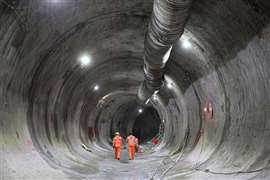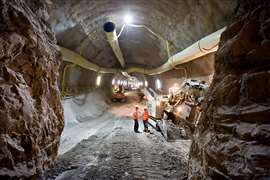Are construction companies unfairly made scapegoats when projects go wrong?
12 June 2024
 Aerial view of HS2’s London Euston construction site (Image: HS2)
Aerial view of HS2’s London Euston construction site (Image: HS2)
Are construction companies an easy target for politicians and the wider public when projects go wrong?
That’s the view of a built environment professor who holds positions at universities in the UK, Australia, and South Africa.
The comments from David Edwards, professor of plant and machinery management at Birmingham City University’s School of Engineering and the Built Environment, come as multiple major contractors have emphasised how they are cutting down on their exposure to riskier projects where they could be held responsible for budget or schedule overruns.
They also coincide with news about delays to high-profile projects, including the Co-op Live arena in Manchester, which saw 14 events involving acts like Olivia Rodrigo and Take That cancelled over several weeks because of overrunning works.
Meanwhile, it emerged last month that the UK government will release another £1 billion (US$1.25 billion) for the delayed and over-budget high-speed railway HS2 to ensure that it reaches its planned central London terminus at Euston, after Prime Minister Rishi Sunak took the controversial decision to cancel the ‘rest of the project’ north of Birmingham in October last year.
But professor Edwards, who is adjunct professor at Nelson Mandela University in Port Elizabeth, South Africa, visiting professor at the University of Johannesburg, and honorary professor at Deakin University in Australia, told Construction Briefing that politicians should avoid making major projects into a “political football”. Construction companies involved in building them did not always deserve the blame when things go wrong, he asserted.
 Professor David Edwards
Professor David Edwards
“A lot of the things that are delaying projects at the moment are black swan events. These events are unpredictable – war, the COVID pandemic, and changes to government policy that have to be amended to cope with those dreadful events.
“But it’s all too easy to turn around afterwards and say it was the contractor’s fault. If we look at the gestation period of a contract, often they are negotiated and escalated many years before the works actually start,” he added, highlighting that it can be hard to predict such events and the effect they have on projects.
Meanwhile, clients, particularly those who lack experience in construction, may add changes to the project as it moves along, leaving the contractor to cope with those too, he added.
At the same time, contractors are under pressure to keep costs down. “Many of the contractors I work with are taking low margins on their projects. There’s a misconception in society that construction companies bid low and inflate the price once works start but it’s not strictly true (as often changes are due to, among other things, client requests) nor really reflective of the professionalism of the people working in our sector and doing a tremendous job under difficult and dynamic circumstances,” says Edwards who, unusually for an academic, started his career as a bricklayer.
Infrastructure ‘for the national good’
He argued that countries in the West needed to become better at agreeing what infrastructure and other projects were in the national interest and then offering them their full support.
“We have to move away from these political footballs and move towards asking what is in the national interest,” he said. “We have to have good infrastructure. We need to try to preserve the environment as best we can but to move businesses forward and create the wealth, jobs and healthcare that everyone wants, we need effective infrastructure to modernise our country and keep us competitive globally.”
“If you look at some of our competitors like China, they get projects delivered much more quickly because they have the resources to make a project a success. They have learned a lot over the years and made many mistakes en route but there’s a lot to be said for projects having full political and national support,” he added.
And Edwards asserted that situations like the Ukraine war and the post-pandemic supply chain crisis had highlighted just how critical heavy industry and infrastructure, and consequently construction, are to western economies like the UK.
Strategies to identify cost and schedule overruns
Nonetheless, Edwards said there were strategies that construction companies could adopt to get better at identifying potential sources of delay over cost overruns before they arise.
“I would say this as a professor but one of the things we can do is run systems theory analytics in a business to trace through the pinch points that occur – that will lead to the answers to some of these problems,” he said.
“And at the client brief stage, you need to make sure that the client is fully on board with the ramifications of everything that goes forward.”
Clients also have a role to play, specifically when it comes to making sure that contractors aren’t being squeezed too hard on price, he said.
However, he cautioned. “With black swan events, I don’t think anyone has really developed any form of model that can predict certain things happening, whether it is force majeure, war, or covid. These sorts of events are very difficult. What we can do is build more resilience into the early estimate but with all the pressure to keep costs down, we are not really achieving that.”
He did concede that the informal nature of the construction market also allows less reputable companies to proliferate and that having a well-recognised certification scheme for companies to show a minimum standard of conformity and competence would also help to improve the industry’s image.
STAY CONNECTED



Receive the information you need when you need it through our world-leading magazines, newsletters and daily briefings.
CONNECT WITH THE TEAM










